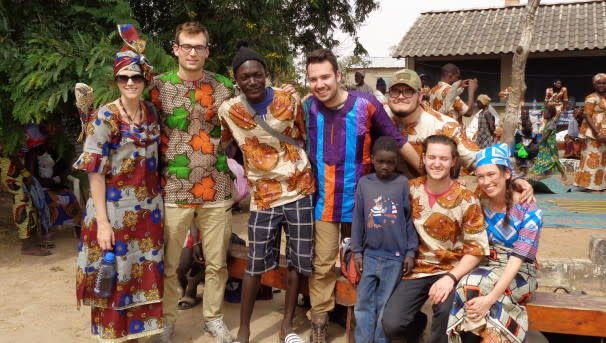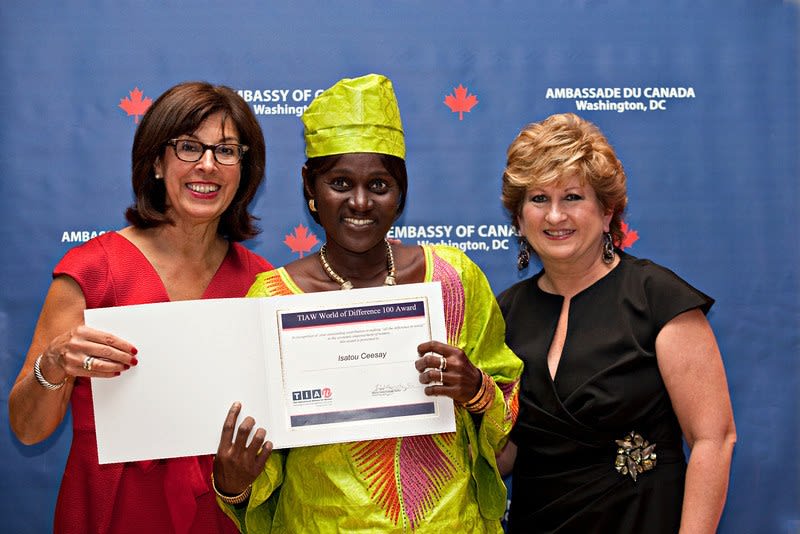THANK YOU!
Hello Friends of EWB-OSU,
Our Buckeye Funder campaign was a huge success thanks to your donation! We were able to surpass our goal of raising $4,694 to help improve the lives of the people in Njau. As the travel team leaves in August to start work on implementing a crop fence project and a solar powered irrigation system for the community, they have all of you to thank for making the projects a reality. The students in our club are truly humbled and inspired by your support.
Because of your help, we can confidently move forward with our project. Please continue to share the word on our project and support Engineers without Borders at the Ohio State University as we continue to work on creating sustainable engineering solutions.
Thanks you again to all the donors for the support over the last month, we could not have done this without you!
EWB-OSU

Inspiring Partner Organizations
We have an awesome and very important story we would like to show you below, but first we wanted to thank all of our generous donors who have helped us reach 69% funding! We cannot put in to words how thankful we are for your support and willingness to help us invoke change in Njau. Below we will see how one small change can lead to a big impact! Please continue spreading our message to your friends and family, so in three days you can visit our page and see we have reached our funding goal!
Our project in Njau would not be possible without our partner organization, Women’s Initiative Gambia (WIG). They are a group dedicated to helping disenfranchised women in Gambia increase their income and standard of living. They coordinate projects in rural areas that empower women by providing financial training and giving them a voice in their community.
This April, Engineers without Borders at The Ohio State University in collaboration with the Sustainability Council was able to bring WIG’s founder, Isatou Ceesay, onto campus to talk for our event Time for Change. The event was organized by EWB-OSU International Project Lead Jared Brown and was created to shed light on humanitarian international development and the different aspects that go into it. Isatou was able to describe how she was able to start her organization, the projects she has been able to implement and where she sees the initiative going next.
During her talk, Isatou detailed how she has empowered women and advocated for ending plastic waste for over 17 years. She first started the recycling center of Njau in 1997 to educate the villagers on the importance of recycling. In Gambian culture, women are expected to raise children, cook, clean, and care for crops while waiting on their husbands to come home from work. Isatou wanted to flip these expectations and bring women the freedom of financial independence. This mission led to her founding Women's Initiative of The Gambia. The organization now has over 2000 members in over 40 communities and is now collaborating with the European Union and United Nations.
The event also included EWB-OSU academic advisor Amanda Davey, who is the Project Manager for Global Water Institute (GWI). GWI’s mission is to provide sustainable systems solutions for communities facing water resource challenges. The GWI integrates research, education and extension to tackle specific water resource issues with global applications. Their three current focus areas:
- Wells to Wellness: Improving sustainable water, sanitation, and hygiene access in developing countries
- Field to Faucet: Delivering new systems solutions for harmful algal blooms
- C(ity) to Sea (in development): New approaches for resilient coastal communities
Isatou and Amanda have played a large part in forming our partnership with the people of Njau, and we have learned a great deal from them and their colleagues. Our project will support both organizations by reducing the time women spend gathering water and tending to crops, leaving more time to generate income and improving the sustainable water access in developing communites.
To learn more about WIG and Isatou’s award winning children’s book One Plastic Bag, visit http://oneplasticbag.com/ and http://womeninitiativegambia.org/ To learn more about GWI and their projects around the globe visit http://globalwater.osu.edu/about-gwi/.


Help our vision for Njau become a reality!
Thanks to everyone so far for your support in our campaign! We have raised $1,434, 32% of the $4,375 goal we set to implement our project. These donations are bringing us closer to improving the wellbeing of the people of Njau and making our designs into a reality. We are getting closer and closer to our goal! If you have donated already, thank you so much and please share our page to your friends and family to help us reach our goal!
The execution of the project will require multiple trips to the Gambia in order to oversee the construction. As we’ve mentioned, our club has sent two groups to the community over the past year and a half. These trips have allowed us to build a shared vision with the members of the community and gather the necessary data to create technical designs.
The students who traveled to the Gambia on behalf of our club practiced engineering in the real world and built lifelong friendships with the people of Njau. This deep engagement with a culture so different from our own was a priceless educational experience. The relationships built extend beyond the trip as the community truly brings us in during our short time there. Below is an excerpt from our blog from our previous assessment trip regarding one of the first days in the Gambia where all the travel members got Gambian names and families:
Once we were dressed, we walked over to the learning center in the community where the community members had gathered with the elders. We all sat around the edge of a stone circle with mats placed in the middle. The family members and some of the volunteers sat in the circle around the edges. We were called up one by one and we took off our shoes and sat down on the mat. The elders would then put a bit of water on our hair pretending to shave or wash it and then the naming would start. As you sat in the middle unsure of what was going on, the different community members would bid on what they wanted your name to be. Once we were named, we were also given to a family. Our mother and father would step forward and greet us giving us another article of clothing...When everyone had received a name and a family, plates of food appeared and were passed around. It was a bitter peanut snack a bit like crumbs. Bowls then appeared and the women started playing them and dancing. We joined in around the dancing circle and each tried dancing with our moms and the volunteers. There were varying degrees of success at dancing in our group, but we all enjoyed it.
Another experience showed the importance of long term commitments and community involvement in humanitarian engineering projects. Sierra, a previous travel member and fundraising chair at EWB-OSU, had a conversation with a community leader after they finished mending a broken water tap. She writes:
Later that day, the man in charge of turning the flow on and off returned to the community so we had a chance to interview him and learn about the system. This conversation brought up an issue of charity work around the world, which is the lack of focus on sustainability. The company that installed the system didn’t train anyone on how to maintain it or how it worked. When one of the parts broke, it took the company a month to get out to the system and once it was fixed, they left without telling anyone what they did.
Your contributions allow our student members to learn invaluable lessons like these that come with executing a project and engaging with the Gambian people. We want to extend our deepest gratitude for your continued support!

$6
Buckeyes Giving Back
Sending the 6 students on each trip to have a life changing experience.
$13.15
Doing Good Across the Globe
Improve the lives of the people living at 13 degrees North and 15 degrees West.
$23
Improving Infrastructure
Help to renovate the 23 water sources in the community including water taps, wells, and hand pumps.
$120
Providing Relief
In the heat of the dry season, temperatures can reach up to 120 degrees Fahrenheit.
$500
A Brighter Future
Contribute to creating a better future for the children of Njau
$2,000
For all of Njau
Provide a richer quality of life for the 2000 people who live in Njau.





